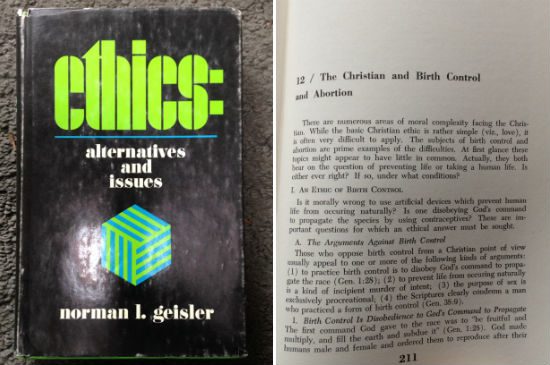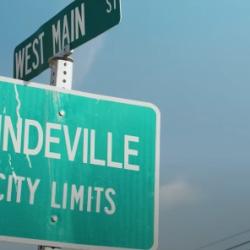For my birthday I bought myself a book that’s almost as old as I am. It’s from 1975, as you may be able to tell from the groovy cover design. Even Zondervan Press covers were groovy in the ’70s.

This is one of more than 100 books written and published by Norman Geisler who, at 84, is still remarkably prolific. Most of his focus over the years has been on “apologetics.”
The titles of his books give a pretty good sense of how he understands that — what it is he’s defending, and how he goes about defending it: Inerrancy; The Creator in the Courtroom; Is Man the Measure?; To Drink or Not To Drink; Christianity Under Attack; False Gods of Our Time; The Infiltration of the New Age; When Cultists Ask; I Don’t Have Enough Faith to Be an Atheist; Twelve Points That Show Christianity Is True; Biblical Inerrancy: The Historical Evidence; The Atheist’s Fatal Flaw; ‘The Shack’: Helpful or Hurtful?
Et cetera, et cetera.
As you can probably tell from that small sample, Geisler tends to approach every subject through this same “apologetic” lens, treating all of them as an opportunity to confirm that, as he sees it, God’s truth is plain, clear, evident and certain. As with his writings on theology or philosophy or various popular subcultural controversies, his discussion of ethics takes a methodical, almost arithmetical approach. Proof-text for X, plug X into formula, calculate conclusion. (This makes parts of this book read a bit like the student handbook for a strict Bible college — so much that I was almost expecting to find a section in there on “dress code.”)
But I didn’t buy this book so much for what it says as for what it no longer says — for what it is no longer allowed to say. That’s why I needed this particular edition, because it’s a valuable artifact of white evangelical history. Collecting such artifacts is important because they provide tangible counterweights to the revisionism and collective amnesia that claims such things never existed.
Briefly, Geisler’s Ethics: Alternatives and Issues was first published in 1971. This August 1975 edition is the third printing. The book is still technically in print, but it underwent major revisions and got a new title back in the 1980s. This wasn’t simply an updating but, in several key ways, a retraction, rebuttal and reversal. The new edition — which is used as a textbook in some evangelical seminaries and Bible colleges — is, as now required, strictly anti-abortion. The old edition — which was also used as a textbook in some evangelical seminaries and Bibles colleges at the time — was not.
That reversal did not occur in between the 1971 and 1975 editions of the book, which suggests that it had nothing to do with a “backlash” or a recoiling in moral horror at the 1973 Supreme Court decision in Roe v. Wade. It wouldn’t have made any sense for this book to have changed in response to Roe, since that ruling is based on the same moral and ethical reasoning found in Geisler’s original edition (minus the proof-texts).
We’ll come back to this later to look in more detail at the specific arguments Geisler makes in the original book for when evangelical Christians ought to view abortion as permissible (and for when they ought to view it as obligatory). For now I’ll just point out the strangest aspect of that argument: Nobody thought it was a big deal.
Geisler’s explicitly evangelical and explicitly pro-choice argument, in 1975, wasn’t in any way seen as remarkable. He was a very conservative white evangelical writing for other very conservative white evangelicals and his brief section on abortion in this book didn’t raise any eyebrows. It wasn’t controversial. It didn’t, in any way, threaten or alter his reputation or regard as a staunch conservative evangelical and defender of the authority of a high view of the authority of a literal, inerrant, authoritative Bible.
In 1975 — two years after Roe — Zondervan Press published a book for white evangelicals in which Norman Geisler wrote: “Abortion is not murder, because the embryo is not fully human — it is an undeveloped person.” And nobody freaked out. Nobody even imagined freaking out. This was simply a restatement of what most white evangelicals believed — a belief that was widely held because it has the advantage of being true.
It’s still true, of course, but white evangelicals are no longer allowed to say so. That’s a huge change.
And that, more than any other single factor, is how we arrived in 2017 at the extremely un-groovy circumstance of 81 percent of white evangelicals for Trump.















